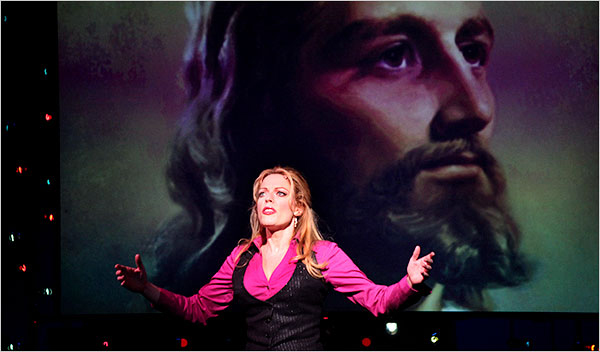'Everyday Rapture' Joins the Culture Wars
/Big media is competing for the hearts and minds of New Yorkers these days, with the Wall Street Journal rolling an edition just for us. The totally different reviews of Sherie Rene Scott’s ‘Everyday Rapture’ by the WSJ and NYTimes suggest that the battle could get interesting, honing in on core values in the American culture wars, where the battle is frequently over women, values, homosexuality, patriarchy.

Writing for WSJ, drama critic Terry Teachout says:
The attractions of “Everyday Rapture” can be summed up in nine words: Ms. Scott is beautiful, sexy and a terrific singer. I loved her in “Dirty Rotten Scoundrels,” and had I seen this show in a cabaret—minus the talk—I might have enjoyed it. Had I paid $116.50 to see it in a Broadway theater, on the other hand, I’d have gone home fuming—not because Ms. Scott sings less well or looks less fetching in front of an audience of 740, but because she has nothing to say that’s worth hearing and spends 90 minutes saying it. via WSJ
In the NYTimes corner, Ben Brantley writes:
Just as the Broadway theater season is drawing to its close, a smashing little show has arrived to remind us of why so many of us keep going back to Broadway, even though it’s broken our heart so many times.
“Everyday Rapture,” which opened on Thursday night at the American Airlines Theater, is by no means a conventional Broadway musical. Yet I can’t think of another production in recent years that captures and explains so affectingly the essence and allure of musicals, and why they’re such an indispensable part of the New York landscape.
I haven’t seen the show but the reviews are generally very good. Any time a woman starts talking about growing up torn between Jesus and Judy (think Garland and Oz), I think ‘culture wars’ and Mars and Venus.
Women should be singing in saloons, not on a soapbox.
Clearly, it’s the talking that disturbs Terry Teachout. His headline reads “She’s so enlightened”.Teachout reveals his own prejudices against the Oprah crowd. Personally, I don’t think he understands women very well, but let’s give him a break.
What man does understand women? And do women understand ourselves? We shouldn’t try, according to Teachout.
The trouble with “Everyday Rapture” is not its implicit belief system—I’m as much of a humanist as the next theater-loving Upper West Side aesthete—but the preening condescension with which Ms. Scott and her collaborator portray her own steady ascent to the heights of greeting-card enlightenment: “Until you learn to love the complicated song you’re living inside, you won’t be able to hear anybody else’s.” (Ooh, wisdom!) Nor does it help that the metafictional character she plays is a wide-eyed cutesy-pie babe whose faux-naïvete is as grating as a piece of industrial-grade sandpaper. Imagine “Inherit the Wind” rewritten by Sarah Silverman and you’ll get the idea.

This is some pretty damn ferocious writing for a newspaper that’s trying to sell art, culture and style to a new group of New York women readers.
Perhaps the message of “Everyday Rapture” hits too close to home. How would I know. This is just idle woman talk, although I note that Mr. Teachout hails from a tiny town Cape Girardeau, Missouri, where he was born 6 February 1956.
Midwestern men prefer their women to keep low profiles and not be melodramatic. Missouri has the toughtest laws in the land when it comes to reproductive rights.
I don’t even know Teachout, so I should keep my mouth shut.
In his own wpords, the MIssouri man shares more insights into how his mind works, writing When Drama Becomes Propaganda. I don’t know about the Clyde Fitch Report either, but he writes Terry Teachout: Water Carrier for the Dramaturgical Right.
Yes, indeed. I’ve accidentally stumbled into the New York media culture wars. Here’s a dose of Sherie Rene Scott, who is actually the star of the show and is stupid enough to think that she has something relevant to say about womanhood and our role in the universe. (Readers know that I actually like the WSJ quite a lot; no apology required).
Interviews with Sherie Rene Scott and the Cast of Broadway’s Everyday Rapture























































